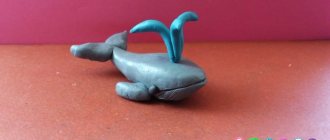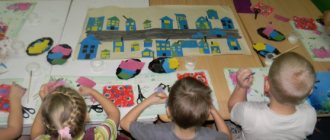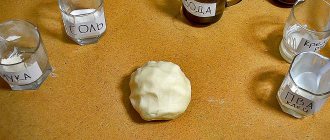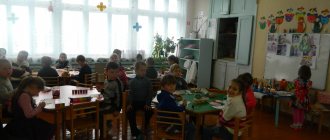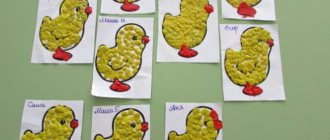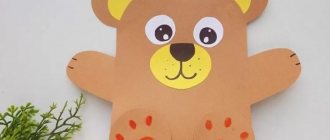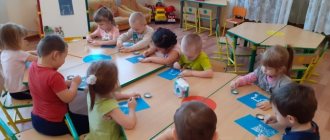Summary of an open lesson on modeling “Treats for dolls”
with the family is dictated primarily by the psychophysiological characteristics of children of this age: the rapid development of the child requires timely changes in the tasks of education and training, restructuring of methods and techniques of pedagogical work. The content of psychological and pedagogical education of parents includes issues of protecting life, strengthening the baby’s health, and creating conditions for proper physical development. On issues of adapting a child to the conditions of public education, hygienic care, balanced nutrition, hardening, daily routine, massage, gymnastics, parents are given recommendations not only by the teacher, but also by the medical staff of the kindergarten. Moreover, advice and recommendations should not be about children in general, but about someone specifically. Methodical recommendations “Memo to parents on musical education in the family”, advice “How to teach a child to be neat”, consultation “Morning exercises at home”, etc.Thus, we can note that parents are the main educators of their children, so the family should play a decisive role in the process of raising and educating children. Only in conditions of partnership between educators and parents are positive results in education possible.
2.3
About the health of preschool children
The interaction of a preschool institution and the family in matters of child health largely depends on the meaning embedded in the concept of “interaction”. In modern educational conditions, interaction in health issues should be considered as a trinity of subjects “teachers - children - parents”. In the opinion of V.A. Shishkina, Professor of the Department of Pedagogy and Methods of Preschool Education, Mogilev State University named after A.A. Kuleshov”, the following theses deserve special attention:
§ The family is the main institution for raising a healthy child, kindergarten is the main source of information about the child’s health.
§ The main areas of interaction should fit organically into the system of health-improving work in preschool institutions.
§ It is necessary to rise to health in interaction: “adults and children - to health together.”
Why is kindergarten the main source of information about child health?
The health-improving system of work in a preschool institution represents a certain standard of a healthy lifestyle, demonstrated to the family as the most optimal for raising a healthy child; A preschool teacher is a transmitter of a culture of healthy behavior and is considered a competent specialist in the field of health education. Parents receive daily information from the teacher about the psychophysical state of the child during the day in kindergarten. Knowing the family, teachers offer parents the necessary information that will help them understand the child’s health problems and look for solutions. At the same time, the teacher must know what the parents’ competence is in matters of child health; conditions of a healthy lifestyle for a child in the family; problems of healthy behavior of parents.
Today, interaction between family and kindergarten in matters of child health is often characterized by mutual reproaches: parents blame the kindergarten for the child’s ill health, teachers blame the parents. Meanwhile, in a preschool institution, many different activities are carried out, including necessary and effective ones, but work with parents is considered as an addition to the main one, since cooperation with the family is not a clear system that would be organically included in the overall system of the educational process.[15 ]
Employees of kindergarten No. 2 in Mogilev interact with parents as follows. At general and group meetings, consultations are held for parents regarding the health of children “OKI are our worst enemies”, “Daily routine is the basis of children’s health”, “Prevention of children’s household injuries”, “Causes of acute respiratory infections”, “It all starts with a toothbrush” and etc. On the stands are posted reminders and advice on “Prevention of poor posture, flat feet”, “Prevention of childhood injuries”, “Games that heal”, “10 commandments of health”, etc. Joint holidays “Health Day” and “Fun Starts” are held.
So, interaction on health issues is carried out in different ways: educating parents, exchanging opinions at parent-teacher meetings, etc.
Conclusion
The problem of cooperation between educators and parents is currently relevant for many scientists. Various programs and new ways of interaction between preschool institutions and families are being developed, and the number of scientific and scientific-methodological works devoted to this important problem is increasing.
Solving the problems of cooperation requires that teachers participate in the psychological and pedagogical education of parents; studied families and their educational capabilities; involved parents in the educational work of the kindergarten.
The organizer and coordinator of cooperation between the preschool institution and the families of pupils is the head. It promotes the establishment of a system for raising children in families and kindergartens, uniting the teaching staff and parents to solve this problem.
The main tasks and approximate content of cooperation between the preschool institution and parents are outlined in the annual plan, the head and senior teacher.
Positive results in raising children are achieved with a skillful combination of different forms of cooperation, with the active inclusion in this work of all members of the preschool team and members of the pupils’ families.
Currently, urgent tasks continue to be individual work with families, a differentiated approach to families of different types, care not to lose sight and influence of specialists who are not only difficult, but also not entirely successful in some specific but important issues families.
Parents show activity and high civic responsibility if relationships with teachers are built on openness, trust, cooperation, and interaction.
Involving parents in participating in the educational process helps improve their overall pedagogical culture, provides an opportunity to better understand their own child, adequately assess his development, behavior and communicate with him.
Consistent coordinated interaction between educators, specialists, and administration is the key to effective interaction with the family, ensuring a system of work, balancing activities for pedagogical education of parents, and protecting the rights and legitimate interests of the child.
The family has a significant educational impact on the child; no teacher can compare in this with parents. A child, receiving primary socialization in the family, gains experience in a preschool institution: communication with peers, cooperation with other children and adults, independent activity. The opportunity to develop creatively with the help of teachers. Education in the family and the work of teachers in a preschool institution complement each other, as a result of which the child receives harmonious development.
The teaching staff plays the main role in establishing contact with parents. But, at the same time, parents should be active and help establish positive relationships with teachers.
A modern kindergarten helps a prosperous family and in some ways replaces a child with a problematic family. He trains and advises parents, passes on traditions and educates a person of the future. And from this point of view, preschool education has much more significance for society than just a place where children are taught and developed.
Thus, based on the above, we can say that our hypothesis was confirmed. Close cooperation between family and preschool institution really contributes to the education of well-rounded, physically and mentally healthy children.
Literature
1. Educators and parents: From work experience. Comp. L.V. Zagik, V.M. Ivanova. - M.: Education, 1985. - 96 p.
2. Guz A.A. Interaction between preschool institutions and families: a manual for teachers of institutions providing preschool education. education / Mozyr: LLC Publishing House "Bely Veter", 2007.
3. Kindergarten and family / N.F.Vinogradova, G.N.Godina, L.V.Zagik and others; Ed. T.M. Markova. — 2nd ed., rev. and additional - M.: Education, 1986. - 207 p.
4. Kozlova S.A., Kulikova T.A. Preschool pedagogy: A textbook for students. Ped. textbook establishments. - 4th ed.: - M.: Publishing House, 2002.
5. Non-traditional forms of interaction between a preschool institution and the family / T. S. Lobanok. — 2nd ed. - Mozyr: LLC Publishing House "Bely Veter", 2003.
6. Ozhegov S.I., Shvedova N.Yu. Explanatory dictionary of the Russian language. — 2nd ed., revised and supplemented. - M.: Az, 1994.
7. Panko E. A. Psychology of personality and activities of a preschool teacher: Monograph. - Mn.: BSPU, 2005. _ 231 p.
8. Pedagogy. Textbook for students of pedagogical universities and pedagogical colleges / Ed. P.I. Faggot. - M.6 Pedagogical Society of Russia, 1998. - 640 p.
9. Podlasy I.P. Pedagogy. New course: Textbook for students. ped. universities: in 2 books. — M.: Humanite. ed. VLADOS center, 1999 - Book 1: General basics. Learning process. - 576s.
10. Podlasy I.P. Pedagogy. New course: Textbook for students. ped. universities: in 2 books. — M.: Humanite. ed. VLADOS center, 1999 - Book 2: The process of education - 256 p.
11. Chechet V.V., Korosteleva T.M. Family and preschool: interaction in the interests of the child. Minsk "University" 2000
12. Adukatsiya i vyhavanne, No. 2, 2001// Kindergarten and family: cooperation and interaction M.M. Yarmolinskaya, A.A. Petrikevich.
13. Hoop, No. 1, 2008 // Modern child: family plus kindergarten.
14. Pachatkovae navuchanne, No. 6, 2001// Interaction between kindergarten and family V.I. Ermak.
15. Praleska, No. 2, 2008 // Family and preschool institution: interaction in the interests of the child. Materials of the “round table” held on December 21, 2007.
(V.A. Shishkina: Protecting and strengthening the physical and mental health of children as the primary task of teachers and parents.).
16. Child in kindergarten, No. 2, 2005 // World of communication of a child L.A. Penkova, T.I. Samofalova, G.M. Karataeva.
Annex 1
Plan of interaction with parents for the 2008 - 2009 school year. G in the “Pochemuchki” group 3-4 years of age
| month | Form, theme. | responsible |
| WITH | 1. Consultation “OKI is ours” | Art. m/s. |
| E | worst enemies." | |
| N | 2. Consultation “Daily routine is the basis” | Art. m/s. |
| T | children's health" | |
| I | 3. Consultation “Warning” | Educators |
| B | children's domestic injuries" | |
| R | 4. Group parent meeting « | Music Hand. |
| b | “Introducing parents to the plan | |
| collaboration on music. | ||
| education for a new student year". | ||
| 5. Express information “Information | Gym teacher. | |
| about diagnostics" | ||
| ABOUT | 1. Group parent meeting | Educators |
| TO | “Tasks of education and training” | |
| T | 2. Consultation “Causes” | Art. m/s. |
| I | occurrence of acute respiratory infections" | |
| B | 3. Consultation “It all starts with | Art. m/s. |
| R | toothbrush." | |
| b | 4. Consultation “Individual” | Educators |
| approach to the child" | ||
| 6. Recommendations “Homework” | Gym teacher. | |
| N | 1.Consultation “Non-traditional” | Art. m/s. |
| ABOUT | methods of fighting colds | |
| I | diseases" | Nutritionist |
| B | 2. Consultation “How not to feed | |
| R | child? | Art. m/s. |
| B | 3.Consultation “Why child | Music hands |
| Are you sick? | ||
| 4.Consultation “The influence of music on | Music hands | |
| child's psyche." | ||
| 5.Health Day “Mom, Dad, Me” | Educators | |
| sport family". | Educators | |
| 6. Consultation “Television and children” | Educators. | |
| 7.Consultation “If your child | Gym teacher. | |
| left-handed" | ||
| 8. Tips “I picked up a pencil!” | Educators. | |
| 9. Entertainment “Health Day” | Educators. | |
| together with parents." | ||
| D | 1. Instructions for preventing violations | Art. m/s |
| E | posture, flat feet. | |
| TO | 2.Memo “Prevention of children | Art. m/s |
| A | injuries" | |
| B | 3. Memo “Games that heal” | Art. m/s |
| R | 4.Pedagogical cooperation “How | |
| b | involve parents in making | Music Hand. |
| costumes, participation in New Year's | ||
| Performance." | Educators | |
| 5.Design of a dedicated newspaper | ||
| New Year's holiday. | Educators | |
| b. Questionnaire "Patriotic" | ||
| parenting" | gym teacher | |
| 7. Tips “10 commandments of health.” | ||
| I | 1. Exhibition of literature on the topic “Game” | Educators |
| N | 2.Consultations on the topic of games and toys. | Educators |
| IN | 3.Consultation “Children’s infections and their | Doctor |
| A | prevention" | |
| R | 4. Methodological recommendations « Memo | Music hands |
| b | parents on musical issues | |
| family education" | ||
| 5. Tips “How to teach a child | Educators | |
| neatness." | ||
| 6.Consultation “Morning exercises” | Gym teacher. | |
| Houses". | ||
| F | 1. Design of family newspapers | Educators |
| E | dedicated to Defender's Day | |
| IN | Fatherland" | Educators |
| R | 2. Questionnaire “Are you good? | Music Hand. |
| A | parents?" | |
| L | Z.Muz. sport. Holiday "Holiday | Nutritionist |
| b | brave warriors" | Gym teacher. |
| 4.Consultation “Nutrition and Health” | ||
| 5. Joint holiday dedicated to Defender of the Fatherland Day. | ||
| m A R T | 1.Consultation “The role of vitamins in the proper development of a child” 2.Consultation “All children are naturally musical.” 3. Design of newspapers “We are mother’s helpers.” 4.Consultation “Raising up in a single-parent family” 5.Consultation “How to choose the right sport?” 6. Joint holiday “Mother’s Day” dedicated to March 8th. | Art. m/s. Music director Educators Educators Gym teacher. Educators |
| APRIL | 1. Questioning “to punish or not?” 2. Health Day “fun starts” 3. Consultation “raising the need for a healthy lifestyle in preschoolers” 4. Recommendations “breathing exercises at home.” | Music teachers Hand. Doctor Fizruk. |
| MAY | 1. Final group meeting “So we have become a year older.” 3. Leisure activities for children and parents “Seven “I” in one house.” 4. Joint entertainment dedicated to family day. 5. Information “About diagnostics”. | Head Teachers Music Hand. Gym teacher. Gym teacher. |
Appendix
2
QUESTIONNAIRE FOR PARENTS
Dear parents!
We ask you to fill out a questionnaire on the topic of punishment. Perhaps you have repeatedly faced the problem of whether to punish or not to punish your child. How did you get out of this situation?
The questionnaire is anonymous. We hope that your sincere answers will help
We need to understand the system of relationships that you build with your child.
1. Punishments occur because _______________________
2. I have to punish my child when _____________________
3. What kind of punishment did your parents use towards you as a child?
a) slap; b) belt; c) slap; d) pinched; d.) scratched; e.) beat
fist; g) deprived of food; h) put in a dark place; i) placed in a corner;
j) put on knees on the rump; k) didn’t talk; m) deprived of pleasures; n) others_______________________________________________________________
4. What punishments do you consider possible to apply to
to the child?__________________________________________________________
5. What punishments do you actually apply to your child?_________________________________________________
Who, from your point of view, was the most aggressive in your parents’ family?________________________________________________
In your family?
_________________________________________________
8. Can you hit your child in a public place?_________________________________________________
9. Raise your voice at him? ________________________________________
10. Why and in what situation can you hit a child?_________________________________________________
What irritates you about your child?_________________________
As a wife (husband)?______
In parents?_______________________________________________
In yourself?_____________________________________________
15, Gender of the parent who filled out the questionnaire______________________________
THANK YOU VERY MUCH!
WHAT TYPE OF PARENT AM I?
1.
Do you like your baby?
2.
Do you listen to what the child says?
3.
Do you look at your child when he speaks?
4.
Are you trying to create in your child a sense of significance in what he says?
5.
Do you correct your child's speech?
6.
Do you allow your child to make mistakes?
7.
Do you praise your baby and hug him?
8.
Do you laugh with your baby?
9.
Do you set aside time every day to read to your child and talk with him?
10.
Do you play any games with your baby?
11.
Do you encourage your child to pursue his interests and hobbies?
12.
Does the child have at least one or two books of his own?
13.
Does your child have at least one place at home (for example, a shelf) that is reserved only for him?
14.
Do you try to set an example for your child by reading newspapers, magazines, books?
15.
Do you discuss anything interesting you have read with your family and child?
16.
Do you try to say everything for your baby before he opens his mouth: a) at the dentist; b) in the store?
17.
Will you watch TV with your child?
18.
Do you ask your child questions about the meaning of what he saw on TV?
19.
Do you limit your child's ability to watch TV?
20.
Does the child have the opportunity to show the “power of his muscles” in games, kneading, squeezing and slapping clay, etc., in order to express his feelings within the framework of generally accepted behavior?
21.
Do you try to go for walks around the area with your baby?
22.
Are you going to take your child to McDonald's, the zoo or a museum?
Key to the test:
The answer “almost always” - 4 points, “sometimes - 2 points”, “never” - 0 points.
If you scored from 44 to 88 points, great; from 22 to 44 points - not bad; less than 22 points - it’s worth thinking about.
Is there anything you can change to improve your rating?
Appendix 3
Consultation
“Should I give my child pocket money?”
You can give money if...
ь He understands the problems of parents, understands that money must be earned and this is a lot of work. Tell us more about your work and your child will show such understanding already in the first grade.
b He knows why he needs money and can quite clearly answer what he will spend it on. The end goal isn't really that important. Will he buy himself chewing gum every day or put money in a piggy bank? The main thing is that the desire to have pocket money is meaningful.
b He knows how to go to the store. That is, before you more or less regularly give him a certain amount, check his ability to make small purchases for the home. He must be able to calculate the amount received from his parents so that it is enough for milk, bread, and sausage, and do not forget the change at the store.
A child is not old enough to have pocket money if...
b He has little idea where his parents work and how they get money. Such naivety occurs not only among children of wealthy parents who do not know how to count money, but also among children whose parents earn very little, but try their best so that the child does not notice this.
b He does not know how to give up small desires for the sake of a “high goal.” He does not want to limit himself in his desires; he refuses to save money for any major purchase.
b He is uncontrollable. If a child behaves badly, does not keep his promises and likes to lie, pocket money will serve him poorly. He may believe that money is given just like that, and not for any merit.
Tips for parents:
ь You should not give your child pocket money before he starts going to school.
b If you decide that your child has the right to pocket expenses, try to ensure that this is not a concession to his blackmail. Otherwise, the growing blackmailer will decide that it is enough to “put pressure on the ancestors” and you will get everything.
Of course, the amount you give to your child depends on the family's income. And yet, do not forget that this is pocket money, which means there should not be a lot of it.
When switching to money relationships, increase the child’s responsibilities. If he considers himself old enough to manage a certain amount at his own discretion, it means that he is quite old enough to do some household chores.
If you decide that it is too early for your child to have his own money, do not rudely refuse him. Explain to him why you are against pocket money and how you can earn it. There is no need to make a specific connection to grades or household assignments. Otherwise, very soon the child will not want to learn history or wash the dishes “just like that.” Rather, we need to encourage his good behavior, diligence, and desire to help. Therefore, it is quite possible to “punish with a ruble” a rude person. He must understand that if he offended his parents or got into a fight at school, he does not deserve financial rewards. Still, by giving your child a certain amount, you must teach him that money must be earned.

